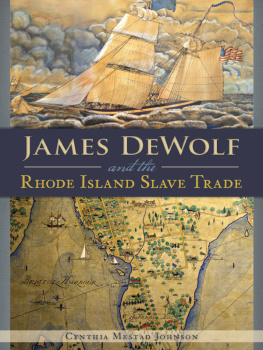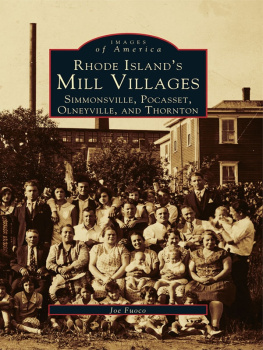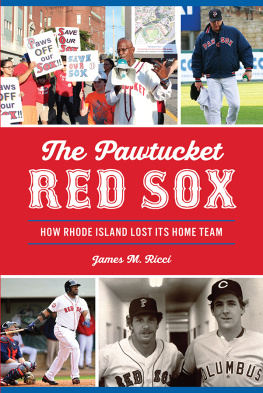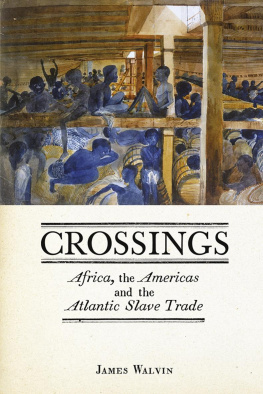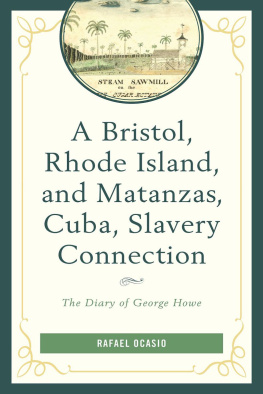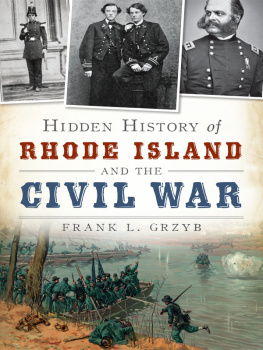Published by The History Press
Charleston, SC 29403
www.historypress.net
Copyright 2014 by Cynthia Mestad Johnson
All rights reserved
Front cover, top: Watercolor of the Macdonough by Jonathan Alger Jr. Photo taken by author, with permission from the Bristol Historical and Preservation Society. Bottom: Bristol harbor and town. This is a very large original painting, artist W.E. Howe, 1931. Photo taken by author with permission from the Bristol Historical and Preservation Society.
First published 2014
e-book edition 2014
ISBN 978.1.62585.015.7
Library of Congress Cataloging-in-Publication Data
Johnson, Cynthia Mestad.
James DeWolf and the Rhode Island slave trade / Cynthia Mestad Johnson.
pages cm
Includes bibliographical references and index.
print edition ISBN 978-1-62619-479-3
1. DeWolf, James, 1764-1837. 2. Slave traders--Rhode Island--Biography. 3. Slave trade--Rhode Island--History. 4. United States. Congress. Senate--Biography. 5. Rhode Island--Biography. I. Title.
F83.D49J64 2014
306.36209745--dc23
2014002587
Notice: The information in this book is true and complete to the best of our knowledge. It is offered without guarantee on the part of the author or The History Press. The author and The History Press disclaim all liability in connection with the use of this book.
All rights reserved. No part of this book may be reproduced or transmitted in any form whatsoever without prior written permission from the publisher except in the case of brief quotations embodied in critical articles and reviews.
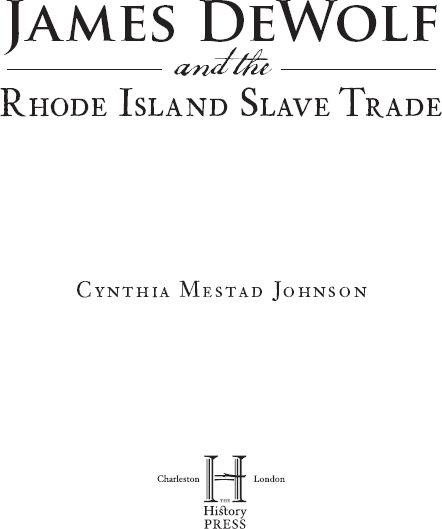
This is dedicated to my dad.
Its the personal journey and the legacy that matter.

PREFACE
I once saw two beautiful children playing together. One was a fair white child; the other was her slave, and also her sister.
James DeWolf, of Bristol, Rhode Island, was a nefarious and wealthy slave trader. As an infamous early figure in the American slave trade during the late eighteenth and early nineteenth centuries, DeWolf emerged as a major entity, rivaling the even more famous John Brown of Providence, Rhode Island. Yet this narrative remains undocumented in our nations historical record. Throughout this book, I will show how DeWolf continued to prosper and pursue his trading ventures despite the increasing restrictions on the international trade imposed by the nations new federal government. This Rhode Islander was able to evade the local and federal authorities by wielding power that he amassed through his central role in sustaining Bristols economy. DeWolf, unlike other slave traders, was able to organize a vertically integrated empire from which he controlled all aspects of the business, ranging from insuring vessels to the transportation of kidnapped Africans and their sales in the United States, West Indies and Cuba. Not only did DeWolf own the enterprise and its ancillary divisions, but he also captained many of the voyages, which helped him become one of the largest contributors toward the perpetuation of enslaved people in our nations history.
What was revealed within the archival records was DeWolfs calloused attitude toward the slave trade and his ability to manipulate the legal system. Outlining the state and federal restrictions on the international slave trade, DeWolf found it increasingly difficult to control his destiny, so he became actively involved in politics. He served as a member of the House of Representatives in the state of Rhode Island for multiple terms and as a United States senator, going so far as to change his political affiliation from Federalist to Republican in support of Jeffersons quest for the White House.
This book has corrected the historical record regarding the prosecutable activities of James DeWolf. It will also enrich the understanding of the role played by New Englanders, particularly Rhode Islanders, in the transatlantic slave trade. The central role that the North played in the continuance of the international trade has, until recently, been basically unexplored. What is revealed is that slave traders from Rhode Island helped to prolong the illegal trade for the South.
When examining DeWolf, it is imperative to recognize that he personally extended the plight of the African race both domestically and internationally. What has been determined is that the motivation to allow the slavers of the state to continue was in part based on the principle that the local economy was dependent on this illegal industry. The reality remains that James DeWolf and his family continued to escape the law and carry out their business, even after the 1808 trade moratorium, while building their family empire. This book is an important historical contribution and reference point for future studies on the American slave trade during the colonial era of our nation.
CONTENTS
ACKNOWLEDGEMENTS
This book could not have been fully accomplished without the collaborative efforts of many people. I am deeply thankful for the emotional, spiritual and financial investments that were made by everyone in my immediate family. But more importantly, everyone involved believed as deeply as I did in correcting the historical record.
I would like to thank the Bristol Historical and Preservation Society (BHPS), which was by far the largest contributor of information and unending support for the last four years. I have found that it will be difficult to properly thank Derwent Jean Riding, president, and her board for how they have supported this project.
I have developed lifelong friendships through this journey that have also made valuable contributions toward the realization of this book. In no particular order of importance because they have all bestowed their knowledge on this research, I would like to thank: Mark J. Prak, Esq.; Nancy Kougeus, archivist and Cuba travel partner; Nic Adams, New York archivist; Mary Millard, private collection and images; Christy Nadalin, consultant; Reverend Cecilia Perry and Dr. Matthew Perry, family genealogy; Janelle Temnick, web design and formatting; Mike Dolan, editing; Dr. Jill Watts, mentor; Ron Wetteroth, St. Eustatius historian and images; David Tebaldi, Cuba tour advisor; Tom DeWolf, James DeWolf Perry V, Nancy Abercrombie and Dana Gibson, family history; Reinhard Battcher III, BHPS curator; Claire Benson, BHPS historian, Cuba travel partner and Rhode Island landlord; Pam Meyer, Joan Roth and June Truitt, BHPS; Jim Connell, Robin Tremblay and David Harrington, Linden Place; Louis Cirillo, town clerk, Town of Bristol; Bert Lippincott III, reference librarian and genealogist, Newport Historical Society; Katherine Fox, reference, Baker Library, Harvard Business School; and J.D. Kay, rights and reproductions manager, Rhode Island Historical Society. If I have neglected to list someone who has been a part of this journey, it is with pure and utter innocence on my part and should not be taken personallymy apologies.
It goes without saying that family is the most important thing in my life, so a heartfelt thank-you to my sons, Tim Clinton, digital technician, images, maps, tables and formatting, and Matt Clinton, editing and insightful historical input; to my incredible parents, Dr. Orv and Shirley Mestad; and, without question, to the most supportive and understanding husband, Bill Johnson.
Lastly, a message to Casey: I hope that you will continue to be steadfast in your inquisitiveness and never forget how much you are loved.
Next page
